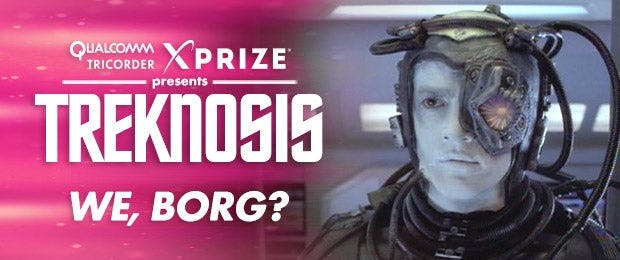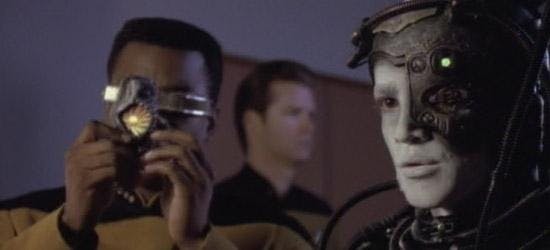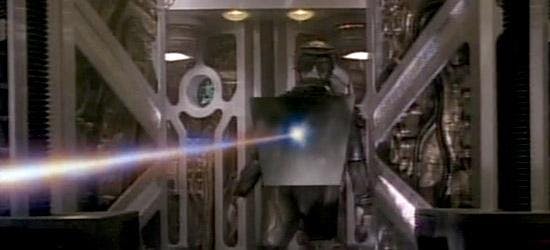
It seems like we always talk about how scary the Borg are. I mean, sure they're a bunch of drones with no individual will of their own, a relentless drive to assimilate all life in the galaxy, and no sense of pity, empathy, or remorse -- but we already knew that. How about we flip that coin for a second and see what's on the other side? What's good about 'em? Are there any advantages to being a Borg?I say there's one: cybernetic implants. Who wouldn't want the ability to process spatial relationships instantaneously with the aid of an enhanced eye?

Or how about being able to interface with -- even try to take over -- computer systems you've never seen before without needing to touch them?

And don't tell me you wouldn't find a built-in personal force field generator handy, either.

As for the downside, well, there is that pesky, all-intrusive Borg hivemind -- relentlessly voracious and brutal in its implacability. But is that the inevitable end result of cybernetic enhancement, or just an unfortunate misstep? If a dozen of us woke up tomorrow and felt like replacing an eye with a piece of multispectral machinery or spot-welding a shield array to our spine, would we necessarily also think to wire all our minds together, or could we just skip that part? Cyborg implants don't necessarily have to lead to a buzzing hive of drones. That’s all I’m saying.
Speaking of missteps, I think I'd actually be more concerned about the danger of permanently replacing limbs or organs. Walk down this hypothetical road with me a mile or two: let's say that a couple of decades from now, we invent an ocular implant that can see up and down the electromagnetic spectrum. Useful, right? Suppose it becomes extremely popular -- so popular, in fact, that eventually it becomes unfashionable in certain social circles to keep your original organic eyes. For some jobs, it even becomes compulsory to get the new robo-eyes (think electrical engineers, night watchmen or military snipers). Then what? Suppose you want to change jobs, or the new robo-eyes become a sign of wealth and privilege, serving as a way to discriminate on sight between the haves and the have-nots? Or what if you just want to go back to seeing the way you used to, only find out the modification isn't reversible? I'd call this an "I want my hand back" moment.

Happily, we're not even close to that point yet. Before we start enhancing these frail, squishy bodies of ours with shiny technology, we need to get better at just fixing them with said technology. Making better prosthetic arms to replace lost limbs, for instance, or 3D-printing teeth. Back in March, some surgeons in Holland even used a 3D printer to replace the entire top of a women's skull. There’s a video of the procedure here but be warned, it’s not for the squeamish.
Now, I know what you're thinking: the actual origin story of the Borg has never been told in detail. For all we know, this is how they got started! Just fix a limb here or a bone there at first, but once we get good enough at it, we start thinking beyond simple repair jobs and move onto full-fledged enhancements. There are some who might say we've been making tiny forays into that field already; fitness trackers like the Fitbit or the Misfit Shine could count as cybernetics if you look at them the right way ("wearable tech" is fast becoming a buzzword everybody's getting sick of already, honestly), and I can't be the only one who heard some Borg jokes when Google Glass was released into the wild.
But I think it'd be too big a leap to be concerned about the “Borg-ification” of society just yet. After all, things like Google Glass and Fitbits are there for convenience and personal data recording. And even though some devices do upload their data to the cloud, they don't connect users directly to each other aside from the occasional videoconference. So everybody can relax: we may eventually become more than just purely biological beings, but odds are it'll be for fun or for health reasons, and not to become joined in an unfeeling, predacious hivemind! At least, I'm pretty sure
--
Jon Sung is a contributing writer for XPRIZE and copywriting gun-for-hire to startups and ventures all over the San Francisco Bay area. When not wrangling words for business or pleasure, he serves as the captain of the USS Loma Prieta, the hardest-partying Star Trek fan club in San Francisco.XPRIZE is an innovation engine. We design and operate prize competitions to address global crises and market failures, and incentivize teams around the world to solve them. Currently, we are operating numerous prizes, including the $30M Google Lunar XPRIZE, challenging privately funded teams to successfully land a robot on the Moon’s surface, and the $10M Qualcomm Tricorder XPRIZE, challenging teams around the world to create a portable, wireless, Star Trek-inspired medical device that allows you to monitor your health and medical conditions anywhere, anytime. The result? Radical innovation that will help us all live long and prosper. Sign up today to join our mission, be a part of our campaign and win collectibles at: tricorderfederation.org.




